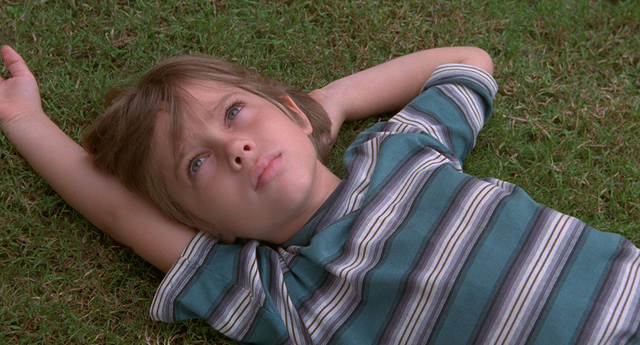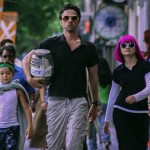As I write this review, encumbered by an embargo that doesn’t allow me to post yet, Richard Linklater’s Boyhood sits at 100% on Rotten Tomatoes, beloved by every critic who saw it.
As much as I wanted to love Boyhood and as much as I do love Linklater, I didn’t find the movie as much as a triumph as my esteemed critic colleagues.
First, the positives. The groundbreaking method of filming over 12 years using the same cast really pays off. It’s amazing to watch the children grow, their personalities emerge and yet stay the same, their humanity flowering. The adults are pretty amazing as well. They change physically as well as internally, something you never see on screen to this degree.
I also was impressed by the acting, especially of Patricia Arquette. She has moments of deep despair that feel very real. Ellar Coltrain is good in the leading role, Lorelei Linklater as his sister, and perennial Linklater collaborator Ethan Hawke has his moments as well.
However, it is not enough for me. It seems to be a trend that well-formed characters are lauded as excellent movies, when in reality it takes more than characters to make a story that works.
I had some of the same issues with The Wolf of Wall Street and Inside Llewyn Davis. In these movies, the audience comes to know the characters, yet story is absent.
Boyhood spans 12 years and has vivid characters, yet it’s hard to nail down what the movie is about. What is the conflict? What is the issue that must be resolved?
One might think it to be “Will Mason grow up?” but that’s a bit vague and not really in question. I hope it’s no spoiler to say that Mason does not die in the movie. Time is inevitable and does, indeed, move him into chronological adulthood.
At the outset, I thought the question might be “Will Mason make peace with his absent father?” but that is only a lightly trod theme. The same question applied to the mother applies even less.
I suppose the closest question is “Will Mason come into a sense of himself and the world, will he grow up in some way that matters?” This could be an excellent conflict but I think the film is more interested in just chronicling Mason’s evolution than really examining it.
Perhaps some viewers feel this question is answered. I did not. Mason at the end of the film felt no more in possession of this sense than he did in the beginning. Nor does he reject or fail dramatically. He’s still unformed, the question is still open.
Lack of conflict is no minor thing. It gives framework to a film and the viewer something for which to cheer. I never felt I had an outcome for which to cheer.
Of course, this very looseness is what characterizes a Linklater film, and the very quality that some people find deeply moving.
All I have to say is variety is the spice of life. Different strokes for different folks. And, it’s a free country.
Which leads me to my other major issue with the film. I was not deeply moved. My heart was not touched.
Other critics describe the opposite. They relate on a primal level to this movie.
And that’s ok.
I did not. As much as I found Arquette’s acting to be good, her character did not touch my heart. I wanted her to take more responsibility for her choices, especially moving a series of men through her children’s lives. I wanted a moment of redemption for her and I did not see it. She endures and she works hard and there is much to admire, but I did not see the internal change I wanted to.
My reaction to the film is that Linklater has a very insightful eye and wove some poignant vignettes together into a 2 hour 45 minute movie that never quite arrives at a destination. I found it novel, excellent in many ways, but ultimately lacking.
People who write about movies are a funny lot. I love my colleagues dearly and I am grateful for every one of them. However, we do tend to be uniform. The theater is overwhelmingly populated with white males, many of them in the first half of life. There are notable exceptions, of course. It makes sense that this movie touched so many critics because it connects with their experience.
Even more than demographic sameness, the type of person drawn towards criticism tends to be urban, liberal, and/or progressive, a mindset that I think of as BlueState. I do not say this because I think Boyhood is a political film. It’s not inherently political, although it does have political elements that reflect on the characters. I raise the issue because I think it shows that critics’ nearly universally shared values inform their reactions to movies and therefore the conversation on movies.
I am a white, conservative mother. My perspective is different.
Sometimes I agree with my colleagues. Sometimes I disagree greatly. This is one of those times.
The entire tone of Boyhood rubbed me the wrong way, the very lack of direction bothered me. I saw Mason as one of those Millennials who drifts through life, unconsciously embracing his entitlement attitude, never finding a passion for which to fight or a real problem to overcome. I saw him as one of those kids currently in their parents’ basement, burdened by school loans, still waiting for something to come along and bring meaning to his life. Perhaps it says way too much about me that I wanted to yell “Get a job, stop whining, and cut your hair!”
Not all Millennials are like that, of course, so many joined the military after 9/11 and were happy to serve their country. Others started businesses, raise families, serve others, and find joy in doing so. I’d rather celebrate them.
I only hope that with Mr. Linklater’s next film, I can join the crowd of enthusiastic admirers. Sincere congratulations to him on a near perfect score.













